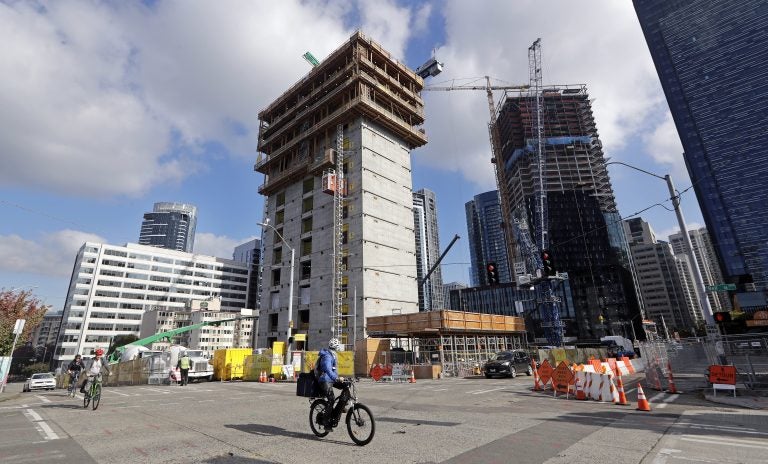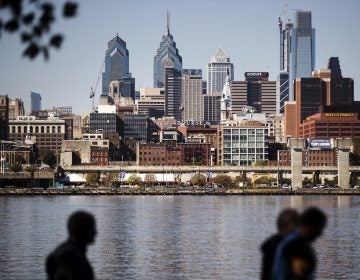Bezos’ preschools come as rich get richer, more generous
From Jeff Bezos' free preschools to Andrew Carnegie's public libraries, education stands out as a favorite cause among America's wealthiest people.

In this photo taken Wednesday, Oct. 10, 2018, construction goes on at the site of a new Amazon building, where space will be provided for a Mary's Place Family Shelter, in downtown Seattle. Amazon.com boss Jeff Bezos' plan to fund preschools in poor communities puts him in the company of America's richest people who have dedicated some of their wealth to education, a legacy that has long challenged the role of poverty and capitalism in philanthropy. (Elaine Thompson/AP)
From Jeff Bezos’ free preschools to Andrew Carnegie’s public libraries, education stands out as a favorite cause among America’s wealthiest people.
And as the rich get richer, and apparently more generous, this legacy of so-called investment philanthropy has shaped government priorities and driven policy changes. But with such high-profile giving fueled by both capitalism and poverty, critics have thrust that dichotomy into the spotlight, challenging how the system that allowed these philanthropists to amass their fortunes ultimately contributes to the social problems they’re trying to address.
Bezos announced this fall he’s dedicating half of his new $2 billion Bezos Day One Fund toward creating free preschools in low-income communities nationwide, which could make him the top philanthropic funder of early education.
It’s unknown if Bezos considers this seed money or a fixed endowment, but the tech titan, newspaper owner and space entrepreneur is clear he wants to disrupt the status quo in the same way his Amazon.com company has changed retail, declaring his preschoolers are “the customer.”
It marks Bezos’ firmest foray into philanthropy so far, though his representatives declined to comment further.
The Amazon founder and CEO in 2018 became the first $100 billion mogul to top Forbes’ annual rankings of the world’s richest people. Forbes’ calculations overall say the world now has more than 2,200 billionaires with a combined fortune of $9.1 trillion, up 18 percent from the previous year.
And that coincides with a record-breaking amount of charitable giving in 2017, according to the annual Giving USA report written by Indiana University. With $410.02 billion in contributions, the total given to education causes across the U.S. was second only to the amount of money given to churches and religious groups.
Larry Lieberman of the nonprofit watchdog Charity Navigator said schools, children and learning have near-universal appeal among the wealthiest philanthropists, who often credit their own success to the opportunities and power of education. And much like faith-based organizations, many well-funded educational institutions are dependent on, and therefore masterful at, fundraising.
Yet for as long as education philanthropy has existed, so has criticism about one man’s funding priorities and what role capitalism, wealth distribution and poverty play in it.
Fundamentally, philanthropy expert David Callahan said, those philanthropists are also advancing the idea that meritocracy can solve the inequality, without affecting the system of capitalism that produces it.
“It’s the myth of the American Dream. The American Dream is that anyone who can work hard enough and improves themselves will succeed,” Callahan said. “Pretty much everyone buys into it at some level, and a lot of philanthropy reflects it.”
America’s leading philanthropists have long favored grander ideas that promise seismic shifts rather than contributing to fixed costs that may better the existing systems of public goods. While approaches have evolved, high-end philanthropy has been successful in leveraging the might of their private, often tax-exempt dollars to push government investment and policy changes in their pursuits.
And whereas some philanthropy amounts to writing blank checks left in presumably capable hands and modestly outlined directives, the wealthiest have personified “venture” or “investment” philanthropy, which hinges on the expectation that the grants prove specific results.
Bezos said he’s building a nonprofit organization to open and operate the free preschools, using the teaching philosophy of Maria Montessori. Bezos himself attended a Montessori school, which generally focuses on individual learning and social-emotional development.
Industrialist Andrew Carnegie built libraries where local governments pledged to fund their operations in the 1900s. The namesake foundation of Sam Walton of the Walmart retail empire has been the largest supporter of privately run, publicly funded charter schools that have become politically polarizing. Microsoft co-founder Bill Gates has reigned as the pre-eminent funder for widespread changes in America’s public school systems for more than a decade, deeply influencing policy, advocacy and research over what kids learn and how teachers teach.
Including Bezos, all four have been crowned the world’s richest man and spent significantly on education philanthropy. While Carnegie, the steel tycoon, built physical educational facilities like the libraries, concert hall and university that still bear his name, Gates as the leader of the computing revolution is known for piloting data-driven school system changes.
Carnegie, as the founding father of big-ticket, full-time philanthropy, was already outspoken about giving away his vast wealth by the time he retired from his steel empire. His manifesto is seen as the prelude to Gates’ “The Giving Pledge,” which urges the rich to give away most of their money. Bezos hasn’t committed to doing the same.
Meanwhile, the low-wage workforce integral to Carnegie’s fortune also bitterly criticized his approach, as he believed “paying” back all of society with learning institutions was a far better use of the profits than allowing individual workers more money for inconsequential personal gains such as more meat and alcohol consumption, said Professor David Nasaw, a Carnegie historian.
Parallel to that Carnegie-era criticism, Nasaw said, is the other half of Bezos’ new philanthropy work in combatting homelessness.
Bezos in November announced his first set of grants, with $97.5 million in donations to 24 local organizations helping homeless families across the country. But earlier this year, Bezos’ company as Seattle’s largest private employer intensely fought the city council’s proposed business tax intended to fund more services for the region’s growing homelessness crisis, forcing city leaders to quickly retreat.
“Philanthropy is the least democratic institution on earth,” Nasaw said. “It’s rich men deciding what to do.”
WHYY is your source for fact-based, in-depth journalism and information. As a nonprofit organization, we rely on financial support from readers like you. Please give today.



